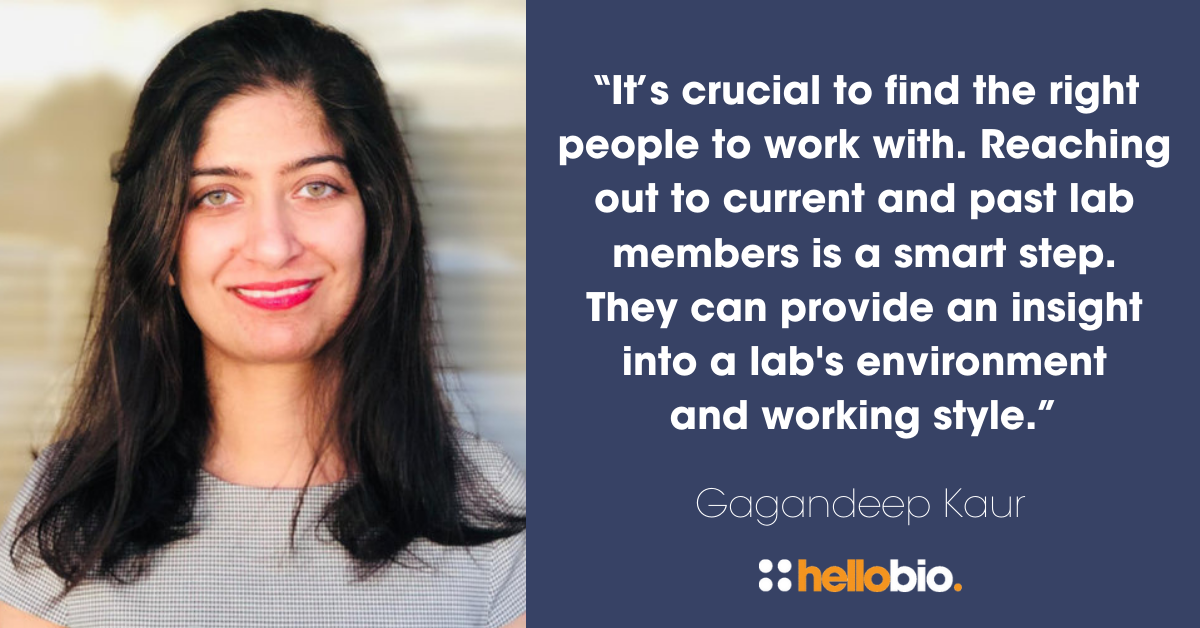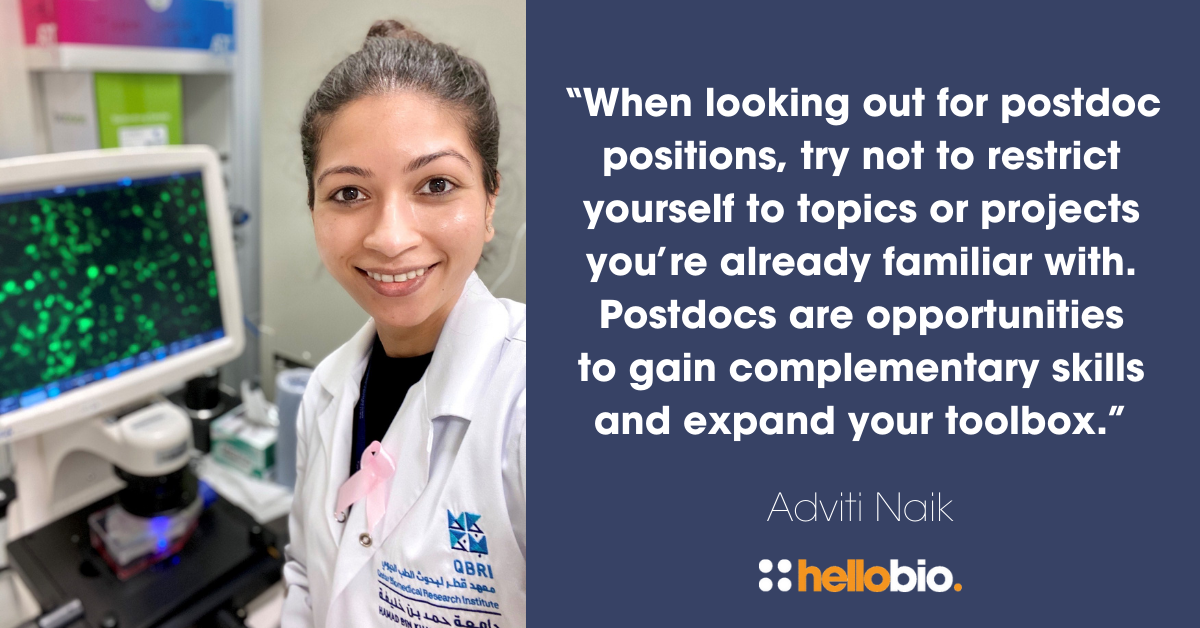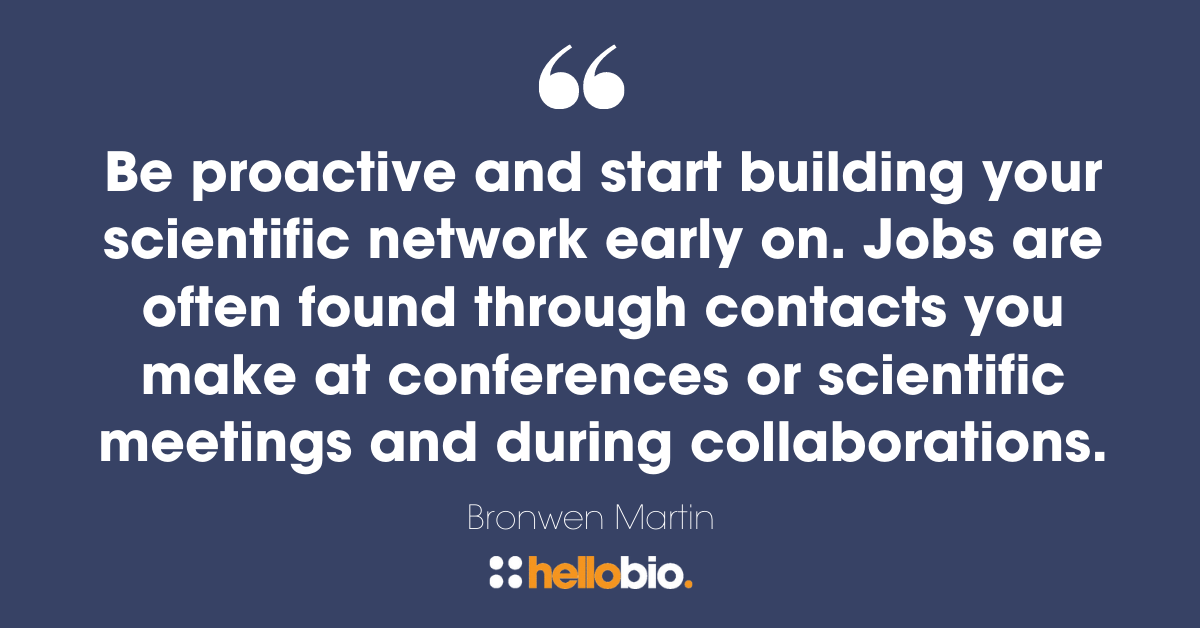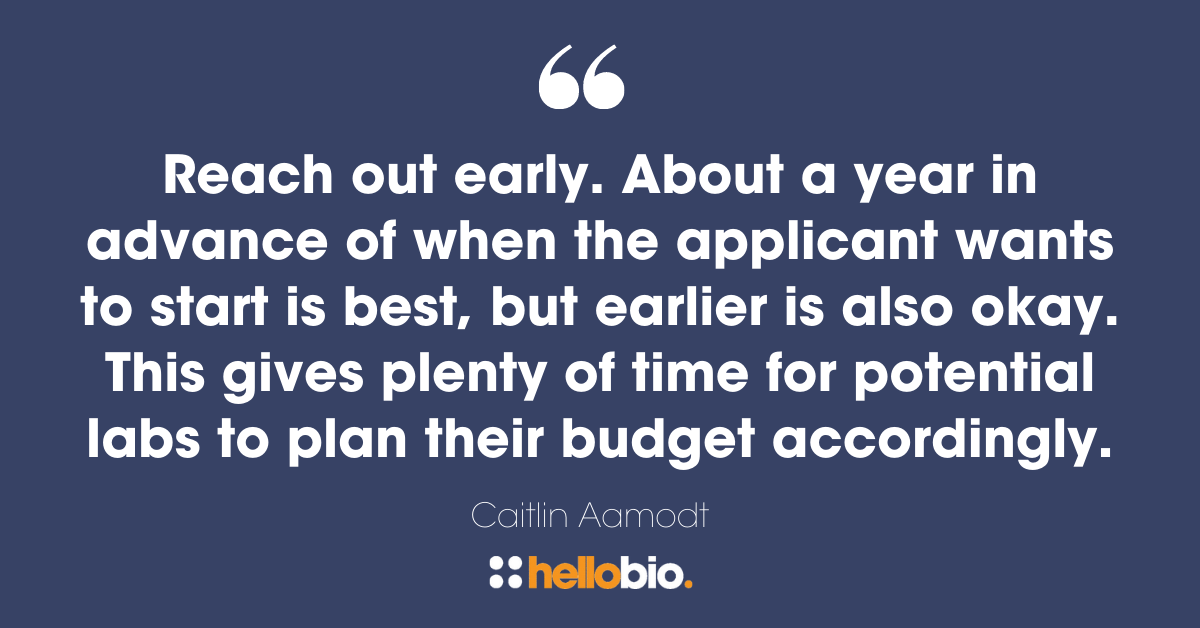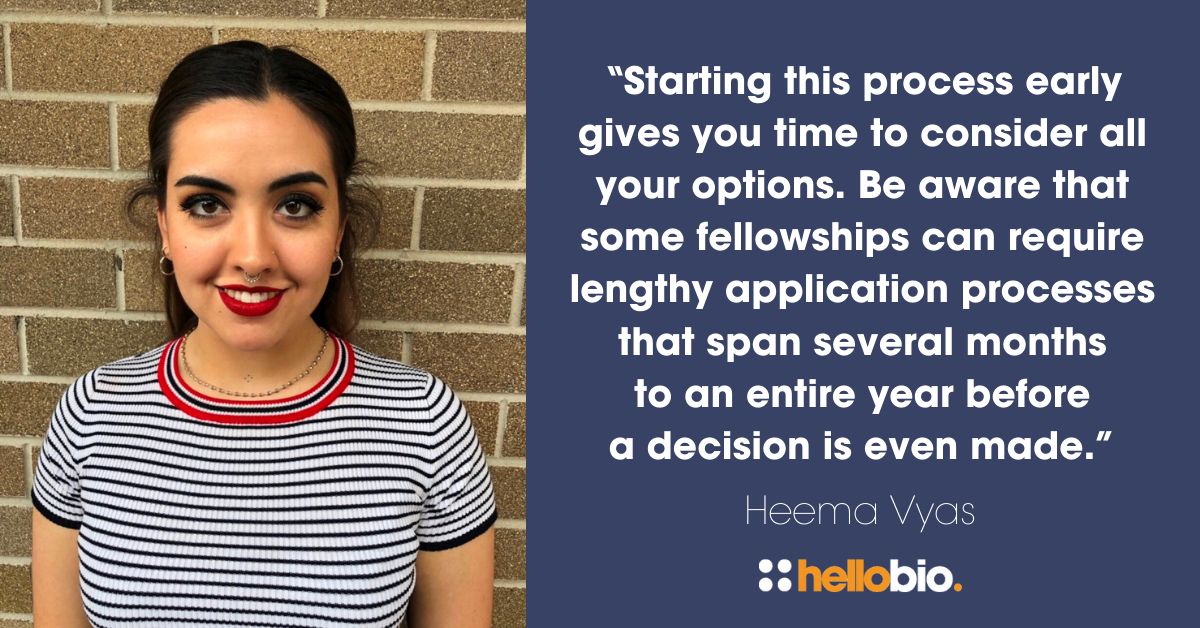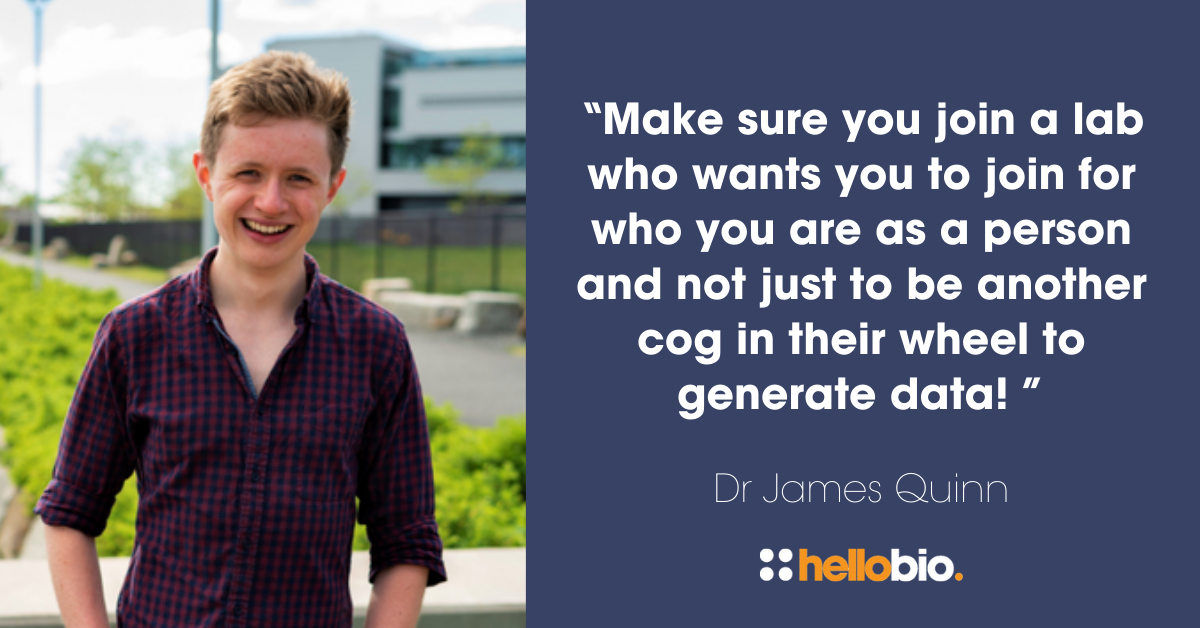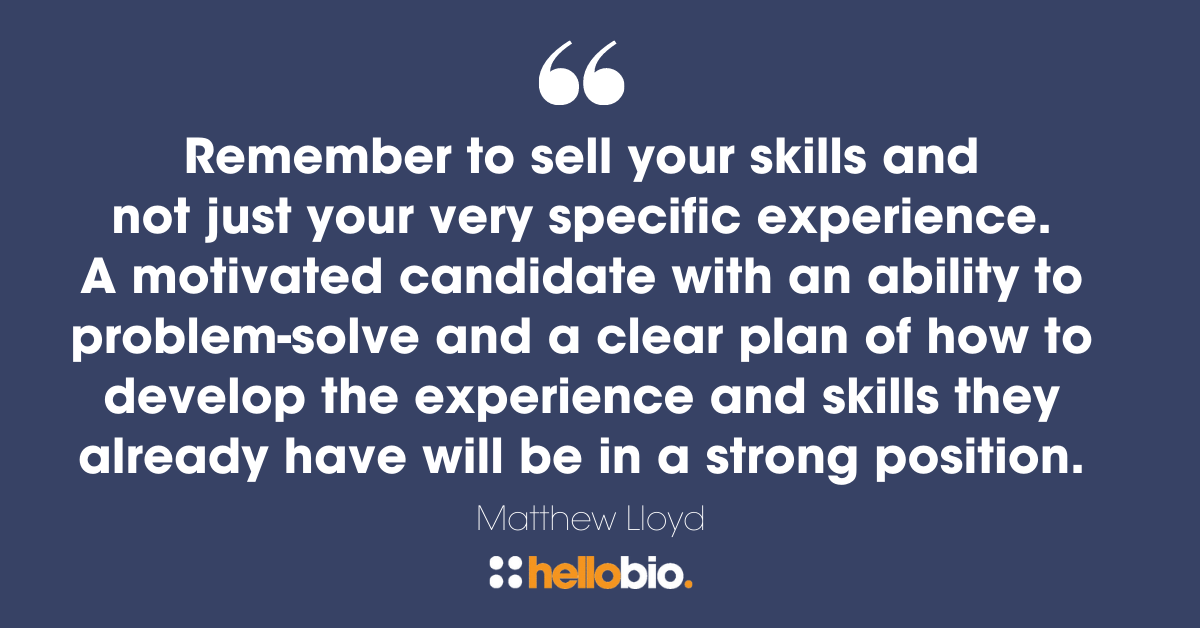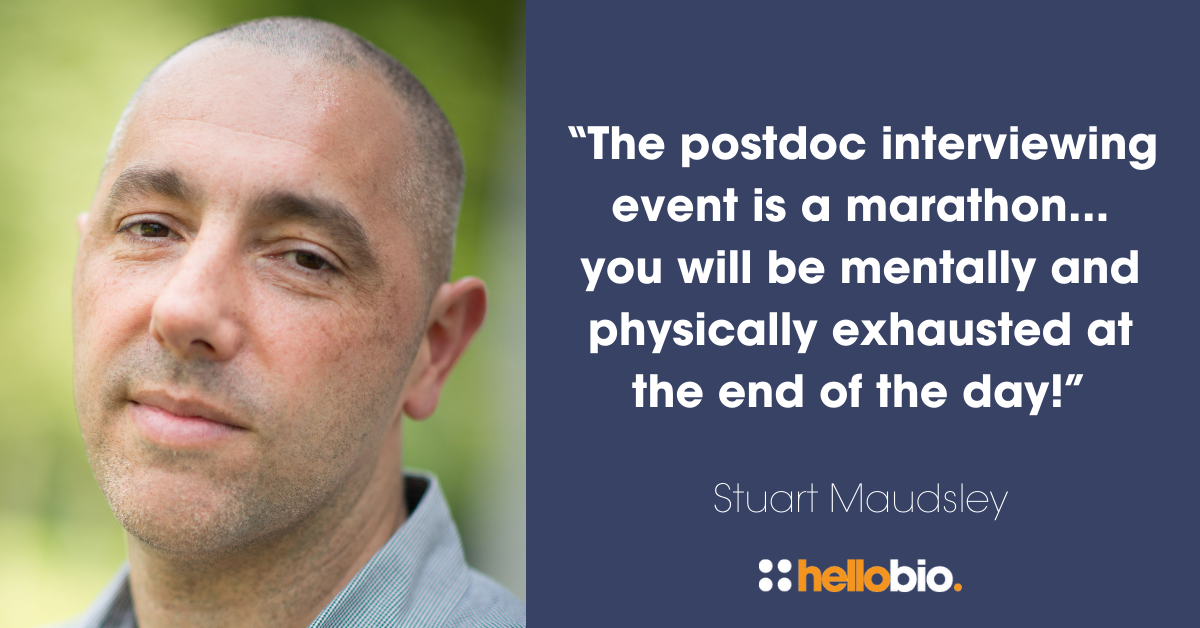The Life Scientists’ Guide to Applying for Postdocs
So you’ve nearly submitted your PhD dissertation, but what next? If you’re looking to apply for a postdoc position, there’s a lot to consider. You’ll need to network for opportunities, choose the right lab, put in an application that stands out from the rest, and impress your potential new PI during the interview process.
We’ve reached out to our online community of life scientists to ask their advice on the postdoc application process, and they’ve shared some of their own stories of transition from a PhD to a postdoc role too. We’ve gathered their very best tips to create The Life Scientists’ Guide to Applying for Postdocs, containing everything you’ll need to help you take that next step on your life science journey:
- Why pursue a postdoc?
- What should you look for in a postdoc role?
- Be clear on your career plan
- Where to look for postdoc positions
- When should you start applying?
- Standing out in a competitive field
- Making the move abroad
- Surviving the interview process
Why pursue a postdoc?
A postdoc is a temporary working position which many consider to be the natural next step after completing a PhD. It allows a researcher to continue their training while gaining new skills and experience that will benefit their long-term academic career. A postdoc position will also prepare a researcher to take on future mentoring roles and senior responsibilities as their career progresses.
A postdoc researcher will usually work under a PI or mentor as part of a larger group, and will often carry out research either on a specific project set by the lab, or on a project of their own design.
The average duration of a postdoc is 2 to 3 years, with many researchers taking on more than one postdoc position before applying for a faculty role. Postdocs can be funded via a salary from the university or institution in question, or through grants, fellowships or scholarships in the form of a stipend.
Be 100% sure that a postdoc is the right move for you
A postdoc isn’t for everyone, and it’s important to be certain that it’s definitely what you want to do before committing yourself to 2 or 3 years of further research. It may feel like the obvious next step for your career progression, but that doesn’t necessarily mean it’s the right move for you and your current situation.
Brittany Berdy, a project manager at the Broad Institute of MIT and Harvard recommends looking at your long-term career goals when deciding whether or not to pursue a postdoc. She said: “I’ve seen a number of people apply for postdocs because that’s what they felt was the next step, even though it really wasn’t necessary for where they ended up in their career or where they wanted to go. I think a postdoc is an amazing experience and I highly recommend it; but I think it’s critical that you know you want it and you decide ahead of time exactly what it is you’re hoping to get from the experience.”
Keeping alternative options in mind when applying for a postdoc can help with the decision-making process. Brittany added: “I would encourage anyone who is applying for postdocs to look into alternative options. It can be common for people to feel that this is their only option after graduate school when in fact there are a lot of other options out there. If you’re going into a postdoc it should be because it’s definitely what you want to do and you’re confident in that. And this will make finding the right postdoc position easier because you’ll really know what it is you’re looking for.”
What should you look for in a postdoc role?
There’s so much to consider when looking for a postdoc role and it’s important to seek a position that will broaden your scientific horizons, teach you new skills and allow you to make new contacts. You should consider not only whether the research work is the right fit for your career, but if you are the right fit for the team you are hoping to work with.
You’ll also need to think about location and whether you want to stay at the same institute you’ve been working at, in the same area or even in the same country. It might be that personal or family commitments mean that your options are restricted, or that financially a move away might not be viable for you.
Do your research
Be sure to do as much research as possible into the institute, lab or PI that you are interested in working with to make sure you would be a good fit for each other.
Gagandeep Kaur, a postdoctoral research associate at the College of Medicine, Texas A&M University, stresses the importance of finding the right team. She told us: “It’s crucial to find the right people to work with. Reaching out to current and past lab members is a smart step. They can provide an insight into a lab’s environment and working style. Do not ignore any red flags.”
Bronwen Martin of the University of Antwerp adds that it’s important to find a PI who is going to be supportive of your career. She said: “When visiting a potential postdoc lab, talk to people in the lab to find out if they enjoy working there and if they feel supported by the PI and other lab members. Choose a lab based on the PI and not necessarily on the actual research project. Having a supportive PI will make a world of difference to your career and will open many academic doors.
Consider what is important to you
Be sure to think hard about what is important to you, not just professionally but from a personal perspective too. Choosing a postdoc at a prestigious institution might look impressive on your CV, but be aware of the sacrifices you might be making in order to accept such a position. A move abroad may be tempting, but if being away from your family or learning a new language doesn’t appeal to you, then it’s important to prioritise what does.
Gagandeep Kaur told us: “It’s important to be clear about your research interests when shortlisting labs, but be sure to go over all the other criteria which are important to you, eg. demographic preferences, weather or climate considerations, family or personal preferences.”
Dr James Quinn of the Alzheimer's Clinical & Translational Research Unit at Massachusetts General Hospital, USA, knew he was keen on a move abroad but was looking for something specific in a potential role and also in a supervisor. He told us: “I was looking for a postdoc in another country, and specifically a postdoc that would be more translational than my PhD which was focused on the cell biology of Alzheimer's disease. I was also looking for the right fit in my supervisor. I knew I wanted someone who would push me but also give me lots of positive encouragement that I was doing well."
Think outside the box
When you’ve spent the last few years learning all there is to know about your PhD subject, applying for a postdoc in the same field would seem like an obvious move. However, there is much to be said for looking a little further afield, stepping out of your comfort zone and considering a postdoc in a new area of study.
Adviti Naik, a postdoctoral researcher at the Qatar Biomedical Research Institute decided to follow a different path when it came to applying for her postdoc. She told us: “When looking out for postdoc positions, try not to restrict yourself to topics or projects you’re already familiar with. Postdocs are opportunities to gain complementary skills and expand your toolbox. My PhD project was mainly computational and although this was exciting for me to learn coming from a molecular biology background, I terribly missed bench work in the lab. So I knew that when it was time for me to look for a postdoc, I wanted a more lab-based project while doing some computational work on the side. Keeping your interest at the forefront rather than the pressure of following a marked path helps increase work satisfaction in the long run.”
Brittany Berdy explained how attending a talk on honeybees led to a postdoc application on a completely new topic. She said: “I did my PhD in microbial ecology, primarily cultivation based approaches, however, my postdoc was on the honeybee microbiome and the impact of pesticides. I knew NOTHING about insects, but I happened to attend a talk by someone who was looking for a postdoc microbiology to study bees and I thought “this is fascinating!” so I began a conversation with this PI and decided to apply for the position.”
Be clear on your career plan
Having a clear idea of your career trajectory will make shortlisting potential positions easier. If you are able to demonstrate in your application how a particular role might fit well into your long-term career plans it will put you in a stronger position for consideration.
Dr Matthew Lloyd of the University of Bath says: “Having a career plan will make it much more likely that you will have a ‘good’ postdoc experience and will enhance your desirability to employers."
Keep your research profile updated and get published
When it comes to preparing applications, be sure to update your profile and CV regularly. Ensure that any information in the public domain, eg. your Researchgate or LinkedIn profile, your ORCID ID or Google Scholar information is accurate, and where possible, publish your papers ASAP.
Heema Vyas, a postdoctoral research associate at the University of Sydney recommends having first-author papers published: “Many fellowships will ask about your publications. Having papers published, or at the very least submitted prior to or whilst you apply for postdoc positions is important. Moreover, first-author papers will further embolden and strengthen your position as a candidate for the postdoc you are applying for.”
Be proactive when enhancing your profile. Getting involved with helping to plan events, conferences or symposiums demonstrates good organisation skills and will look great on your CV. Involvement with committees, such as university student councils or equality/diversity/inclusivity committees may also give you an advantage over other candidates. Engaging in scicomm by writing blog pieces, producing podcasts or giving interviews about your research is also a great way to express your passion and commitment to your career.
Discuss your intentions with your supervisor
Keep your colleagues, and in particular your supervisor informed of your progress as you begin to think about postdoc positions. Their wealth of experience and potential contacts within the scientific community can be invaluable when it comes to finding the right position for you.
Heema Vyas stresses the importance of keeping your supervisor in the loop as you begin to make decisions about your future. She told us: “Your supervisor can be a useful resource and source of support. They can assist you with applications, interview prep, and can keep an eye out for potential postdoc positions that may become available.”
Where to look for postdoc positions
So you’ve decided that a postdoc is the next step for you, but where do you start to look for available positions? The three most common ways to find a postdoc role are through publicly advertised positions, making ‘cold contact’ with labs or PIs of interest, and good old-fashioned networking.
Check regularly for advertised positions
You will find postdoc positions advertised on websites, in journals and even on social media, so it’s important to get into the habit of checking the most popular sites and publications regularly to see which new vacancies have become available. Search for specific hashtags on social media and follow the social channels of labs similar to those that you are interested in.
Some websites that advertise postdocs include:
If you see a position advertised that you’d like to apply for, it’s important to read the criteria thoroughly to ensure your skills and qualifications are a good match. Matthew Lloyd gives some useful tips on applying for suitable post doc roles: “My colleague and I advertised a postdoc many years ago in synthetic, medicinal chemistry. We got over 200 applications, of which maybe 15 of the candidates were qualified. Most of the other applications were from candidates who had good qualifications, but not what was required for the job. These applications didn’t make it through the first cut. If you are not sure what the position requires, ask the PI a specific question about what they’re looking for before making an application.”
He also added a note of caution when applying for roles through university application systems. He said: “Something which is obvious but is often forgotten, is that if you need to apply through a university’s online system, then make sure you do exactly that. If you send your CV or resumé direct to the PI it will not be considered because it must go through the proper channels. When applying, be sure to include a cover letter saying which postdoc you are applying for and include the reference number. It is not unknown for applications to be misfiled by the HR department if you don’t say which position it is you are applying for. If your application ends up in a pile for the wrong job it will be rejected."
Reach out, but be wary of cold contact
If you’ve thoroughly researched a particular lab and made connections through previous networking opportunities, you might feel confident enough to send a speculative application to express your interest in working there. This is a common approach, and even if that particular lab has no vacancies currently, it could put you ‘on their radar’, meaning they may keep your details on file for future opportunities as they arise.
Gagandeep Kaur agrees that an expression of interest can go a long way. She says: “Reach out to the lab PI or the scientists who interest you. Check out their websites for open positions. It is always appreciated by PIs if you email them to explain why you are excited to work with them. If they have immediate openings, they can hire you quickly depending upon the interactions.”
However, be wary that this approach can have a low success rate. With the more popular labs and PIs receiving many such applications on a daily basis, your expression of interest will really have to stand out in order to have an impact.
Matthew Lloyd explains how being targeted is the key to success. He says: “PIs who are well-known in their fields will get 10 or more speculative postdoc applications every single day, many of which will be unfocussed and not of interest. The key is to be very targeted, and only apply if you know a job will be available at the right time. You can find this out through word of mouth or asking the PI if they have any positions coming up when meeting them at a conference. It is good to target PIs who have taken previous PhD graduates from your current lab as postdocs. If the postdoc has gone on to get several papers or secure a job in science afterwards, it is likely that the PI will at least consider your application.”
He goes on to add: “As you would for an advertised job, be sure to provide a cover letter explaining your skills and experience. Also detail what type of postdoc you want, the skills you want to build and any new knowledge you want to acquire. The advantage of this approach is that you may not have much competition from other candidates if the post has not been advertised."
Network, network, network!
Networking is perhaps one of the most important things you can do to further your career in academia. Making connections, either virtually or in-person at conferences or symposiums, is vital for not only learning about possible openings but for making a name for yourself. Expressing your interest in a particular area and connecting with the leading scientists in those fields is the best way to put yourself forward for possible opportunities.
It can feel uncomfortable, and ‘putting yourself out there’ isn’t always the easiest thing to do, but it can really pay off in the long run. Bronwen Martin told us: “Be proactive and start building your scientific network early on. Jobs are often found through contacts you make at conferences or scientific meetings and during collaborations.”
Brittany Berdy told us how attending a particular seminar led to a job opening for her. She said: “Networking was key for me. I did not apply for any other postdoc positions... but I applied for this one entirely because someone on my committee recommended I go to a seminar to meet a particular PI. So I definitely wouldn’t have gotten the job without networking! I’d say networking is key across the board!”
Social media platforms such as Twitter and LinkedIn can be a useful way to join conversations and connect with people, not just locally, but nationally and internationally too. James Quinn told us: “I never actually "applied" for a postdoc, all of my offers came from conversations at conferences, on Twitter or through my network. For my current postdoc, I actually was approached about 4 months after finishing my PhD. This led to an interview and my subsequent move to the US, so you never know what might happen. Be sure to keep all of your avenues open.”
When should you start applying?
Once you’re sure that a postdoc is what you want to pursue, it’s important to start applying for positions as soon as possible. The sooner you start to put feelers out, the better chance you will give yourself of making the right connections and finding the right postdoc for you.
It’s not uncommon for researchers to start making approaches a year or even two prior to finishing their PhD. Caitlin Aamodt, a postdoc researcher at the University of California San Diego, told us: “Reach out early. About a year in advance of when the applicant wants to start is best, but earlier is also okay. This gives plenty of time for potential labs to plan their budget accordingly.”
Heema Vyas explained why she gave herself 18 months to apply for her postdoc, and warns how lengthy some funding application processes can be: “I decided a postdoc was what I wanted to pursue 1.5 years prior to finishing my PhD. I also decided that I wanted an immediate start after completing my PhD, so on this basis, I would recommend starting this process early as it gives you ample time to consider all your options. Also, you should be aware that some fellowships can require lengthy application processes that span several months to an entire year before a decision is even made.”
If you’re planning a move abroad it’s also advised to give yourself as much time as possible to start thinking about accommodation and to make applications for specific funding. Bronwen Martin told us: “Start applying for postdoc positions early! For positions abroad, apply approximately a year in advance. This then gives you ample time to sort out funding, a work visa and living arrangements.”
James Quinn added: “I had started to contact researchers in other countries about postdocs approximately 18 months prior to finishing my PhD. This is especially important if you need to identify funding, and it gives you appropriate time to apply for grants.”
Consider different funding options
When it comes to funding your postdoc position, there may be a number of different options available to you. Sometimes the university or institute in question will already have made a salary available to fund the role. For other positions you may need to apply for a grant, fellowship or scholarship in order to fund the placement.
Brittany Berdy shared her thoughts on funding. She told us: “I was very fortunate in that there was already funding for my position and I didn’t need to apply for anything prior to starting. However, I did apply later for some funding that was specific to my project, but getting the job was not contingent on securing that funding. I would highly suggest that people apply for funding whenever they can, as grant writing is an important skill in any scientific position. Applying for funding is great practice whenever possible, and it always looks good on your CV if you are successful!”
Standing out in a competitive field
Competition for postdoc roles can be tough, so how do you ensure that you stand out from a crowd of equally keen and qualified applicants?
James Quinn believes that preparation is the key to success, and that doing thorough research is essential. He says: “You are a fantastic scientist, never forget it... do not sacrifice your mental and physical health trying to stand out. Make sure you join a lab who wants you to join for who you are as a person and not just to be another cog in their wheel to generate data! I had only two published reviews by the time I started my postdoc, but what made me stand out was my experimental knowledge, my passion for research, public engagement, science communication, my vision for the research project and my career goals. Do your research… I think I read every paper that our lab had published before applying for my postdoc.”
Good references
Collecting some great references is an important part of the application process. Consider approaching not just your supervisor, but other senior colleagues you have worked alongside during your PhD, particularly those who know your skills and capabilities best. Brittany Berdy said: “I provided three references in support of my postdoc application. I chose the senior scientist in the lab who trained me in microbiology, the lab manager who I had worked very closely with, and my third reference was from someone who I had designed online courses with and had been teaching with for four years. I thought the latter reference provided a good alternative perspective, different from the benchwork perspective that someone from my lab could provide."
The importance of a good cover letter
Your postdoc application should be accompanied by a strong and eye-catching cover letter. A cover letter is your first chance to make a good impression, showcase your qualities, and express your enthusiasm for the role. It’s also a great way to show your personality and give the reader an immediate idea of the sort of person you are. Caitlyn Aamodt explains why a personal approach to your cover letter is important: “It’s good to really personalise your cover letters. Take some time to describe how your experience fits with the lab, and consider giving examples of the kinds of ideas you might have for potential projects.”
Matthew Lloyd adds: “Explain how and why you meet the essential and desirable criteria in your cover letter. If there are over 200 applications for a postdoc position, those from candidates who are not obviously qualified will be immediately rejected. Using the cover letter to highlight how and why you are qualified means that your application will go in the pile to be looked at in more detail.”
Selling your skills
It goes without saying that you will need to include a list of your qualifications and relevant experience with any application, but it’s important to remember to highlight your transferable skills too. ‘Soft skills’ can be just as important to many PIs when considering applications, so think hard about any practical skills you could bring from another position that may have been in a different field, but might be just what that particular team is looking for.
James Quinn told us: “Transferable skills are extremely important. You pick up so many relevant skills during your PhD that are very helpful for starting a postdoc. I'd say one of the most useful skills I’ve learned has been knowing when to ask for help. I am surrounded by so many brilliant scientists who have all been so willing and able to help me out.”
Matthew Lloyd agrees that qualifications are not the be all and end all when it comes to postdoc applications. He said: “Do remember to sell your skills and not just your very specific experience. It is very rare that a candidate will have all the required experience and skills required for a role, but a motivated candidate with an ability to problem-solve and a clear plan of how to develop the experience and skills they already have will be in a strong position.”
Even listing your hobbies outside of academia can be of interest to a potential PI, and might just show a different side of you that appeals to a particular team. Being flexible and an all-round team player can be more important than academic prizes. Heema Vyas told us: “Your CV is more than just your qualifications, academic awards, published papers, or PhD lab experience. Whether you are applying for a Fellowship or an advertised postdoc position, they are almost always looking for well-rounded researchers.”
Making the move abroad
So you’ve found your perfect postdoc position... but it’s on the other side of the world. This will sound like a dream opportunity for many, but a stressful and daunting prospect for others. There’s no denying that a move overseas will pose a number of additional challenges, but it can also offer some unique ‘once in a lifetime’ opportunities that will be hard to turn down.
James Quinn and Adviti Naik both accepted postdoc position overseas, and we asked them about the pros and cons of making the move abroad - here’s what they came up with:
Pros
|
Cons
|
James added: “Moving abroad and organizing visas were the most difficult things at the start, but now the biggest issue for me is COVID-19 and not being able to return home to the UK because of travel restrictions. However, my team has been extremely supportive and understanding, I couldn't ask for more!”
Adviti told us of her experiences abroad: “There is so much to learn and absorb with every move (in the lab and outside), building new networks and gaining additional mentors. It’s also a great way to showcase adaptability on your resume. I’m currently located in the fifth country that I’ve moved to for science and I absolutely cherish the cultural and scientific learning experience gained through this nomadic life.”
Matthew Lloyd notes that there may be additional challenges when applying for positions abroad. He explains: “If you do decide to apply for a job in another country, be mindful that the PI is going to have to justify why they are employing you and not someone from their host country. Science tends to be highly specialised so it can be quite easy to justify based on your specific experience, but it will depend on the general level of demand for postdocs and economic conditions in the host country. Be aware that there may be specific eligibility requirements you’ll need to satisfy in order to allow you to work in the host country.”
Surviving the interview process
If all goes well and your application is successful, you’ll be invited to interview for the position. The postdoc interview process often has multiple parts and can span more than one day. You’ll be expected to present your research ideas, tour the campus, meet and spend time with not just the PI but the other lab members too, and of course face a thorough interview in which you will discuss your PhD research in detail and explain why this role is the right one for you.
Stuart Maudsley, Odysseus Professor of Receptor Pharmacology at the University of Antwerp explains just how draining the process can be: “The postdoc interviewing event is a marathon… you'll be presenting in the morning and then taken around to interview with all of the other affiliated researchers in the destination lab. This is gruelling... you will be mentally and physically exhausted at the end of the day.”
As with any job interview, it’s important to be as prepared as you can, and be sure to come armed with questions for the PI about their expectations of you if you were to be successful. It’s always polite too to follow up the next day with an email or telephone call to thank the PI for their time and to ask for any feedback they might have at this stage.
Preparation and positivity will bring success
At every stage of the postdoc application, preparation and thorough research are vital for success. Being as prepared as you can from an early stage will give you a headstart over the competition. Research prospective labs and PIs thoroughly to give yourself the best possible opportunity to impress them if you reach the all-important interview stage.
Have a positive mindset
Building resilience and having a positive mindset can be invaluable when working through a process like this, and if you’re not successful, remember to use the experience as a learning opportunity rather than dwelling on any mistakes you might feel you have made. Take a moment to read through our excellent resources on building resilience and coping with rejection on the Hello Bio blog.
And finally… enjoy your postdoc success!
It’s a long and gruelling process but when you finally receive that postdoc offer, it’s time to celebrate! As with any great career opportunity, take as much from it as you can and be sure to appreciate the exciting new position you find yourself in. As Stuart Maudsley says: “When you get the excellent job offer you wanted then grab it with both hands and work your socks off for 2-3 years, it's worth it!”
________________________________
An especially big thank you to all of the wonderful contributors who kindly shared their experiences with us to help put this guide together: Caitlin Aamodt, Brittany Berdy, Gagandeep Kaur, Matthew Lloyd, Bronwen Martin, Stuart Maudsley, Adviti Naik, James Quinn and Heema Vyas.
What are your experiences of the postdoc application process? How did you find the right postdoc position for you? What advice would you give to someone just starting the process?
Send us a message on Twitter @hello_bio or email hello@hellobio.com. We’d love to hear from you!
________________________________
If you enjoyed this article, why not check out the other resources available on our blog. We are passionate about supporting life scientists including early career life scientists and PhD students - with really low-priced reagents and biochemicals, early career scientist grants, and resources to help with both personal and professional development. We know how tough it is - so we hope you find these helpful!
More General Support for Life Scientists
For advice on writing papers, dissertations, presenting at conferences, wellbeing, PhD support, networking and lots more, we have a huge range of articles to help - just click below:
Save up to 50% on our high purity reagents...
When you get to the stage of planning your experiments, don't forget that we offer a range of low-cost, high-purity agonists, antagonists, inhibitors, activators, antibodies and fluorescent tools (yes - they really are around half the price of other suppliers!) You can use our Quick Multi-Search Tool to search for lots of products in one go, and the range includes:
- Enzyme inhibitors and activators
- Chemogenetic ligands
- Ion channel modulators
- GPCR & ionotropic receptor ligands
- Cell biology reagents & biochemicals
Technical resources
Try our Molarity Calculator: a quick and easy way to calculate the mass, volume or concentration required for making a solution.
Try our Dilution Calculator: an easy way to work out how to dilute stock solutions of known concentrations
And finally, don't forget to check back in with our blog regularly for the latest content! If there’s something you’d love to contribute to the community, whether that’s an interview or article, drop us a line at hello@hellobio.com
---





